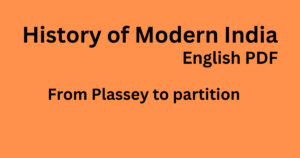
The period from the Battle of Plassey in 1757 to the Partition of India in 1947 is a crucial time in the history of modern India. During this period, India witnessed significant changes, ranging from British colonization to the struggle for independence, which culminated in the partition of the country into India and Pakistan.
The Battle of Plassey marked the beginning of British colonization of India. The East India Company, which was established in 1600, had already established a significant presence in India by the mid-18th century. The company’s main interest was in the trade of Indian goods such as cotton, silk, and spices. However, the company soon began to expand its influence by exploiting the political instability and conflicts among Indian rulers.
The Battle of Plassey, which was fought between the East India Company and the Nawab of Bengal, marked a turning point in the British colonial rule of India. The company’s victory in this battle established its dominance over Bengal and paved the way for its expansion into other parts of India. The company soon became the de facto ruler of India, and its administration was marked by policies that favored the British interests and discriminated against the Indian population.
The 19th century witnessed significant changes in the social, economic, and political landscape of India. The British colonial rule led to the displacement of Indian industries and the exploitation of Indian resources. The British policies led to widespread poverty and deprivation among the Indian population. However, the British also introduced modern education and communication systems, which led to the emergence of a new class of Indian intellectuals who were exposed to the ideas of liberalism, nationalism, and democracy.
The Indian National Congress was established in 1885, and it played a crucial role in the Indian struggle for independence. The Congress initially focused on seeking reforms within the colonial system and promoting the interests of the Indian middle class. However, the Congress soon became a platform for the Indian nationalist movement, which sought complete independence from British rule.
The Indian nationalist movement was marked by various forms of protests, ranging from non-cooperation to civil disobedience. The movement was led by prominent Indian leaders such as Mahatma Gandhi, Jawaharlal Nehru, and Subhash Chandra Bose. Gandhi’s philosophy of non-violent resistance became a powerful weapon against British colonialism and inspired similar movements across the world.
The Second World War had a significant impact on the Indian independence movement. The Indian National Congress launched the Quit India movement in 1942, which demanded immediate independence from British rule. The movement was met with severe repression, and many Indian leaders were arrested. However, the British soon realized that they could no longer sustain their rule in India, and they began negotiations with the Indian leaders for the transfer of power.
The partition of India in 1947 marked the end of British colonial rule in India and the emergence of two new independent countries, India and Pakistan. The partition was a traumatic event that led to widespread violence and displacement of people. The partition was based on the two-nation theory, which argued that Hindus and Muslims were two separate nations that could not coexist in a single country. The partition resulted in the displacement of millions of people, and it led to the loss of lives and property.
The history of modern India from Plassey to Partition is a complex and dynamic period that witnessed significant changes and challenges. The British colonization of India led to the exploitation of Indian resources and the suppression of Indian culture and identity. However, it also introduced modern education and communication systems, which led to the emergence of a new class of Indian intellectuals who were exposed to the ideas of liberalism, nationalism, and democracy.